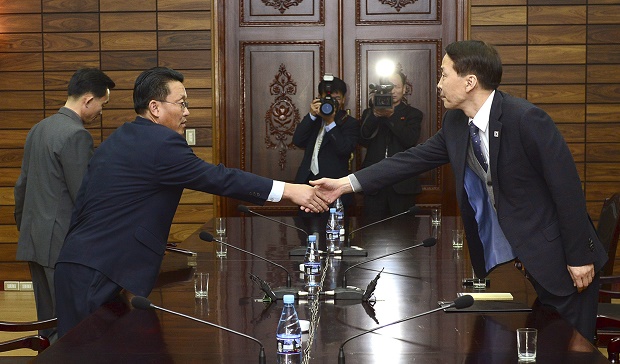2 Koreas hold rare high-level talks

In this photo provided by the South Korean Unification Ministry, South Korea’s chief delegate Kim Kiwoong, right, shakes hands with his North Korean counterpart Hwang Chol during a meeting at the border village of Panmunjom, North Korea, Thursday, Nov. 26, 2015. Officials from the two Koreas met Thursday at a border village to try to realize high-level talks as part of their agreements that defused a military standoff in August. The South Korean Unification Ministry via AP
SEOUL, South Korea—North and South Korea sat down to rare, high-level talks Friday, with each side looking to squeeze concessions from the other on stalled cross-border programmes in which both their leaders have a political stake.
The vice minister-level dialogue, held in the Kaesong joint industrial zone on the North Korean side of the border, was the fruit of crisis talks in August to ease sky-high military tensions on the divided peninsula.
The last such sit-down, with the mandate to discuss a range of inter-Korean issues, took place nearly two years ago.
“The outcome this time could have a significant impact on the path the overall inter-Korea relationship takes next year,” said Cheong Seong-Chang, an analyst at the Sejong Institute think tank in Seoul.
Although any talks between the two Koreas are welcomed as a positive step, precedent suggests any significant breakthrough is unlikely.
Article continues after this advertisementEfforts to establish a regular dialogue have tended to falter rapidly after an initial meeting—a reflection of the deep mistrust between two countries that have remained technically at war since the end of the 1950-53 Korean conflict.
Article continues after this advertisementHeading the South’s side at Friday’s talks was Hwang Boo-Gi, deputy head of Seoul’s Unification Ministry, which handles cross-border affairs. His counterpart was Jon Jong-Su, a vice director of the North’s Committee for the Peaceful Reunification of Korea.
‘Many issues’ to discuss
“There are many issues to be discussed. We will do our best to resolve them one by one,” Hwang said before leaving Seoul.
The elephant in the room for any North-South dialogue is Pyongyang’s nuclear weapons programme. But while Seoul may well raise the issue of denuclearisation, experts said the two sides were likely to focus on more achievable targets.
“The North’s denuclearisation needs to be seen as the ultimate goal of inter-Korea dialogue, not a pre-condition of it,” said Kim Keun-Shik, a professor at the University of North Korean Studies in Seoul.
The talks in Kaesong came a day after North Korean leader Kim Jong-Un said the country had developed a hydrogen bomb—a claim greeted with scepticism by US and South Korean intelligence officials.
There was no set agenda in Kaesong, but both sides have clear, if not necessarily complementary priorities.
The cash-strapped North wants the South to resume lucrative tours to its scenic Mount Kumgang resort, which Seoul suspended in 2008 after a female tourist was shot dead by a North Korean guard.
Restarting the tours would be a useful propaganda victory for North Korean leader Kim Jong-Un, as well as providing a source of much-needed hard revenue.
“Kim needs to shower party and political officials with gifts and boast (about) national wealth to his people,” said Nam Sung-Wook, professor of North Korean Studies at Korea University.
“He also needs cash to complete a batch of recent and ongoing construction projects.”
Family reunions push
South Korea, meanwhile, wants the North to agree to regular reunions for families separated by the Korean War.
Currently the reunions are being held less than once a year and with only a very limited number of participants—despite a huge waiting list of largely elderly South Koreans desperate to see their relatives in the North before they die.
For South Korean President Park Geun-Hye, who came to power with pledges of closer engagement with Pyongyang, a deal on the reunions would represent a welcome feather in her cap.
Park has repeatedly talked up the prospect of eventual Korean re-unification, but has offered little in terms of policy to ease tensions with the perennially belligerent North.
With only two years left until the end of her term, Cheong said Park was “running out of time” to try to build a legacy when it comes to inter-Korean relations.
The talks began just hours after North Korea came under stinging criticism for the second consecutive year in the UN Security Council over its human rights record.
The meeting was chaired by the United States, whose ambassador Samantha Power said Pyongyang’s rights abuses represented “a level of horror unrivalled in the world.”
RELATED STORIES
Rival Koreas to hold high-level talks to defuse war fears